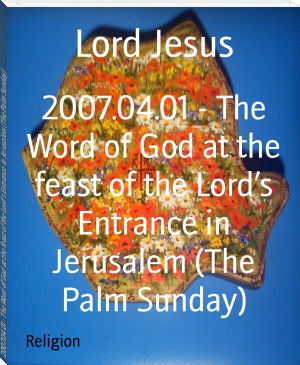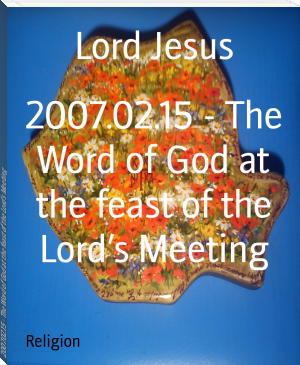Apologia Pro Vita Sua by John Henry Newman (best ereader for manga .txt) 📖

- Author: John Henry Newman
- Performer: -
Book online «Apologia Pro Vita Sua by John Henry Newman (best ereader for manga .txt) 📖». Author John Henry Newman
Another mode of verbal misleading, and the most direct, is actually saying the thing that is not; and it is defended on the principle that such words are not a lie, when there is a "justa causa," as killing is not murder in the case of an executioner.
Another ground of certain authors for saying that an untruth is not a lie where there is a just cause, is, that veracity is a kind of justice, and therefore, when we have no duty of justice to tell truth to another, it is no sin not to do so. Hence we may say the thing that is not, to children, to madmen, to men who ask impertinent questions, to those whom we hope to benefit by misleading.
Another ground, taken in defending certain untruths, ex justâ causâ, as if not lies, is, that veracity is for the sake of society, and that, if in no case whatever we might lawfully mislead others, we should actually be doing society great harm.
Another mode of verbal misleading is equivocation or a play upon words; and it is defended on the theory that to lie is to use words in a sense which they will not bear. But an equivocator uses them in a received sense, though there is another received sense, and therefore, according to this definition, he does not lie.
Others say that all equivocations are, after all, a kind of lying,—faint lies or awkward lies, but still lies; and some of these disputants infer, that therefore we must not equivocate, and others that equivocation is but a half-measure, and that it is better to say at once that in certain cases untruths are not lies.
Others will try to distinguish between evasions and equivocations; but though there are evasions which are clearly not equivocations, yet it is very difficult scientifically to draw the line between the one and the other.
To these must be added the unscientific way of dealing with lies:—viz. that on a great or cruel occasion a man cannot help telling a lie, and he would not be a man, did he not tell it, but still it is very wrong, and he ought not to do it, and he must trust that the sin will be forgiven him, though he goes about to commit it ever so deliberately, and is sure to commit it again under similar circumstances. It is a necessary frailty, and had better not be thought about before it is incurred, and not thought of again, after it is well over. This view cannot for a moment be defended, but, I suppose, it is very common.
I think the historical course of thought upon the matter has been this: the Greek Fathers thought that, when there was a justa causa, an untruth need not be a lie. St. Augustine took another view, though with great misgiving; and, whether he is rightly interpreted or not, is the doctor of the great and common view that all untruths are lies, and that there can be no just cause of untruth. In these later times, this doctrine has been found difficult to work, and it has been largely taught that, though all untruths are lies, yet that certain equivocations, when there is a just cause, are not untruths.
Further, there have been and all along through these later ages, other schools, running parallel with the above mentioned, one of which says that equivocations, &c. after all are lies, and another which says that there are untruths which are not lies.
And now as to the "just cause," which is the condition, sine quâ non. The Greek Fathers make it such as these, self-defence, charity, zeal for God's honour, and the like.
St. Augustine seems to deal with the same "just causes" as the Greek Fathers, even though he does not allow of their availableness as depriving untruths, spoken on such occasions, of their sinfulness. He mentions defence of life and of honour, and the safe custody of a secret. Also the great Anglican writers, who have followed the Greek Fathers, in defending untruths when there is the "just cause," consider that "just cause" to be such as the preservation of life and property, defence of law, the good of others. Moreover, their moral rights, e.g. defence against the inquisitive, &c.
St. Alfonso, I consider, would take the same view of the "justa causa" as the Anglican divines; he speaks of it as "quicunque finis honestus, ad servanda bona spiritui vel corpori utilia;" which is very much the view which they take of it, judging by the instances which they give.
In all cases, however, and as contemplated by all authors, Clement of Alexandria, or Milton, or St. Alfonso, such a causa is, in fact, extreme, rare, great, or at least special. Thus the writer in the Mélanges Théologiques (Liège, 1852-3, p. 453) quotes Lessius: "Si absque justa causa fiat, est abusio orationis contra virtutem veritatis, et civilem consuetudinem, etsi proprie non sit mendacium." That is, the virtue of truth, and the civil custom, are the measure of the just cause. And so Voit, "If a man has used a reservation (restrictione non purè mentali) without a grave cause, he has sinned gravely." And so the author himself, from whom I quote, and who defends the Patristic and Anglican doctrine that there are untruths which are not lies, says, "Under the name of mental reservation theologians authorize many lies, when there is for them a grave reason and proportionate," i.e. to their character.—p. 459. And so St. Alfonso, in another Treatise, quotes St. Thomas to the effect, that if from one cause two immediate effects follow, and, if the good effect of that cause is equal in value to the bad effect (bonus æquivalet malo), then nothing hinders the speaker's intending the good and only permitting the evil. From which it will follow that, since the evil to society from lying is very great, the just cause which is to make it allowable, must be very great also. And so Kenrick: "It is confessed by all Catholics that, in the common intercourse of life, all ambiguity of language is to be avoided; but it is debated whether such ambiguity is ever lawful. Most theologians answer in the affirmative, supposing a grave cause urges, and the [true] mind of the speaker can be collected from the adjuncts, though in fact it be not collected."
However, there are cases, I have already said, of another kind, in which Anglican authors would think a lie allowable; such as when a question is impertinent. Of such a case Walter Scott, if I mistake not, supplied a very distinct example, in his denying so long the authorship of his novels.
What I have been saying shows what different schools of opinion there are in the Church in the treatment of this difficult doctrine; and, by consequence, that a given individual, such as I am, cannot agree with all of them, and has a full right to follow which of them he will. The freedom of the Schools, indeed, is one of those rights of reason, which the Church is too wise really to interfere with. And this applies not to moral questions only, but to dogmatic also.
It is supposed by Protestants that, because St. Alfonso's writings have had such high commendation bestowed upon them by authority, therefore they have been invested with a quasi-infallibility. This has arisen in good measure from Protestants not knowing the force of theological terms. The words to which they refer are the authoritative decision that "nothing in his works has been found worthy of censure," "censurâ dignum;" but this does not lead to the conclusions which have been drawn from it. Those words occur in a legal document, and cannot be interpreted except in a legal sense. In the first place, the sentence is negative; nothing in St. Alfonso's writings is positively approved; and, secondly, it is not said that there are no faults in what he has written, but nothing which comes under the ecclesiastical censura, which is something very definite. To take and interpret them, in the way commonly adopted in England, is the same mistake, as if one were to take the word "Apologia" in the English sense of apology, or "Infant" in law to mean a little child.
1. Now first as to the meaning of the above form of words viewed as a proposition. When a question on the subject was asked of the fitting authorities at Rome by the Archbishop of Besançon, the answer returned to him contained this condition, viz. that those words were to be interpreted, "with due regard to the mind of the Holy See concerning the approbation of writings of the servants of God, ad effectum Canonizationis." This is intended to prevent any Catholic taking the words about St. Alfonso's works in too large a sense. Before a Saint is canonized, his works are examined, and a judgment pronounced upon them. Pope Benedict XIV. says, "The end or scope of this judgment is, that it may appear, whether the doctrine of the servant of God, which he has brought out in his writings, is free from any soever theological censure." And he remarks in addition, "It never can be said that the doctrine of a servant of God is approved by the Holy See, but at most it can [only] be said that it is not disapproved (non reprobatam) in case that the Revisers had reported that there is nothing found by them in his works, which is adverse to the decrees of Urban VIII., and that the judgment of the Revisers has been approved by the sacred Congregation, and confirmed by the Supreme Pontiff." The Decree of Urban VIII. here referred to is, "Let works be examined, whether they contain errors against faith or good morals (bonos mores), or any new doctrine, or a doctrine foreign and alien to the common sense and custom of the Church." The author from whom I quote this (M. Vandenbroeck, of the diocese of Malines) observes, "It is therefore clear, that the approbation of the works of the Holy Bishop touches not the truth of every proposition, adds nothing to them, nor even gives them by consequence a degree of intrinsic probability." He adds that it gives St. Alfonso's theology an extrinsic probability, from the fact that, in the judgment of the Holy See, no proposition deserves to receive a censure; but that "that probability will cease nevertheless in a particular case, for any one who should be convinced, whether by evident arguments, or by a decree of the Holy See, or otherwise, that the doctrine of the Saint deviates from the truth." He adds, "From the fact that the approbation of the works of St. Alfonso does not decide the truth of each proposition, it follows, as Benedict XIV. has remarked, that we may combat the doctrine which they contain; only, since a canonized saint is in question, who is honoured by a solemn culte in the Church, we ought not to speak except with respect, nor to attack his opinions except with temper and modesty."
2. Then, as to the meaning of the word censura: Benedict XIV. enumerates a number of "Notes" which come under that name; he says, "Out of propositions which are to be noted with theological censure, some are heretical, some erroneous, some close upon error, some savouring of heresy," and so on; and each of these





Comments (0)